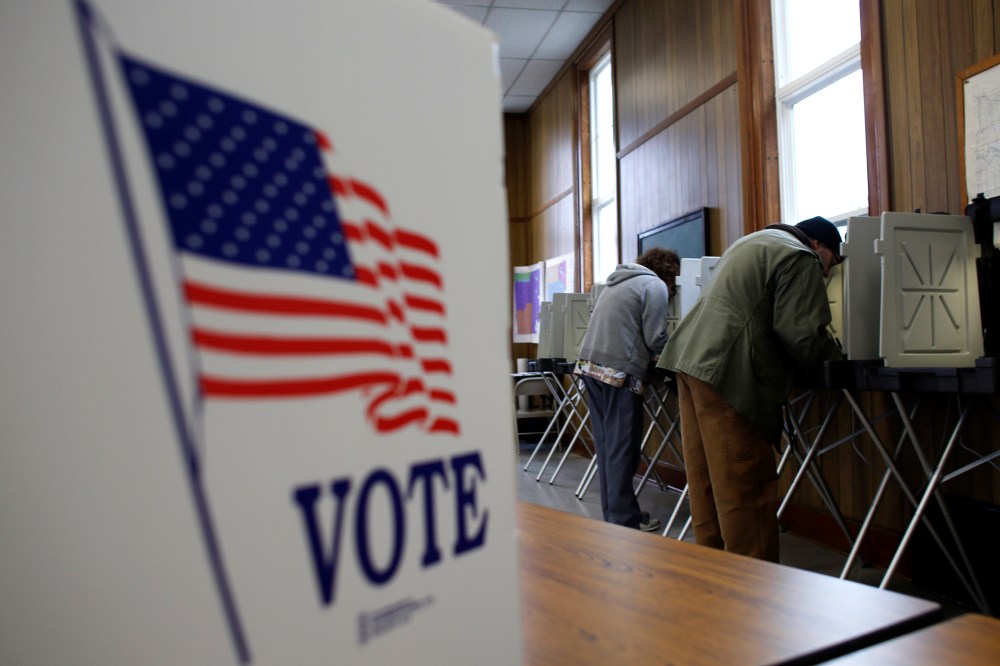After a string of unfavorable court rulings, among other developments, there’s a sense that the voting rights debate could be decisively shifting—and perhaps even that the Republican-led assault on voting rights of the last few years could finally be losing steam—as the sheer injustice of the effort becomes undeniable.
But it’s way too early for voting rights advocates to celebrate.
The struggle for access to the ballot could be at a crucial hinge point. Yes, the empirical case for voting restrictions like voter ID is finally being scrutinized by courts and the press—and it’s disintegrating before our eyes. But at the same time, the GOP is showing few signs of backing off its commitment to making voting harder. Indeed, recent events have shown not that questioning voting restrictions is newly acceptable within the GOP, as some have seen it, but rather the opposite: that support for those restrictions is something like a bedrock position for the party and anyone wanting to lead it.
In other words: The arc of history may bend toward justice—but perhaps not for a few more election cycles.
There are certainly plenty of causes for optimism. Late last month, a federal court ruling didn’t just strike down Wisconsin’s voter ID law—it took a hatchet to the logic behind voter ID. District Court Judge Lynn Adelman found that in-person fraud of the kind that an ID would prevent simply hasn’t occurred in the state, and that around 300,000 legitimate Wisconsin voters—disproportionately non-white—don’t have an ID and could be at risk of disenfranchisement. That conclusion was bolstered when Iowa’s Republican attorney general, Matt Schultz, a staunch voter ID advocate, released the results of a of a multi-year probe showing not a single instance of in-person voter impersonation in the state in recent years.
Adelman’s opinion sparked a slew of editorials arguing, essentially, that the jig was up for voter ID. It also could affect court cases beyond the Badger State—and beyond the narrow issue of ID. The ACLU last month filed a lawsuit against Ohio’s recent cuts to early voting—a legal effort that, experts say, could get a crucial boost from the Wisconsin ruling, which turned on similar issues of racial impact.
Meanwhile, a state court in Arkansas last month struck down voter ID—the ruling has since been stayed—finding that it violates the state Constitution. And Pennsylvania Republican Governor, Tom Corbett, said last week that he wouldn’t appeal a January court ruling against that state’s ID law.
Just as important, Democrats have at last decided to go on the offensive over voting rights. In a forceful speech last month at the National Action Network convention, President Obama linked the issue to the civil rights struggle of the 1960s, and urged supporters to respond to voting restrictions by turning out en masse this fall. If the Democrats’ new approach leads Republicans to conclude that voting restrictions are motivating more Democratic voters than they’re blocking, it could make the GOP reconsider its strategy in a hurry.
Then last week, Sen. Rand Paul, a potential frontrunner for the 2016 Republican presidential nomination, rebuked his party over voter ID, saying Republicans shouldn’t “go too crazy” on the issue because “it’s offending people.” Coming in the wake of the court rulings, and the Democrats’ newly aggressive posture, Paul’s comments seemed like a watershed moment.
Six days later, they look a lot less earth-shaking.
After his mild apostasy on voter ID, Paul was quickly brought back into line. First, he said in a statement that he thinks the issue should be left up to the states—which, by and large, it is—before telling Fox News’s Sean Hannity Tuesday that there’s “nothing wrong” with voter ID, he just wishes Republicans wouldn’t talk about it so much.
%22The%20arc%20of%20history%20may%20bend%20toward%20justice%E2%80%94but%20perhaps%20not%20for%20a%20few%20more%20election%20cycles.%22′
Paul’s walk-back is the inevitable result of some much larger trends. It’s not just that polls show voter ID remains popular—though that’s undoubtedly affecting the picture. More important is the GOP’s strategy for winning elections. For all the talk about the need to court Hispanics, the reality is that the easiest short-term path to victory for Republicans is to double-down on their advantage white voters, and work to make the electorate as white as possible. That means restrictions on voting—which hit blacks and Hispanics hardest—are likely to be a page in the party’s playbook for a while.











